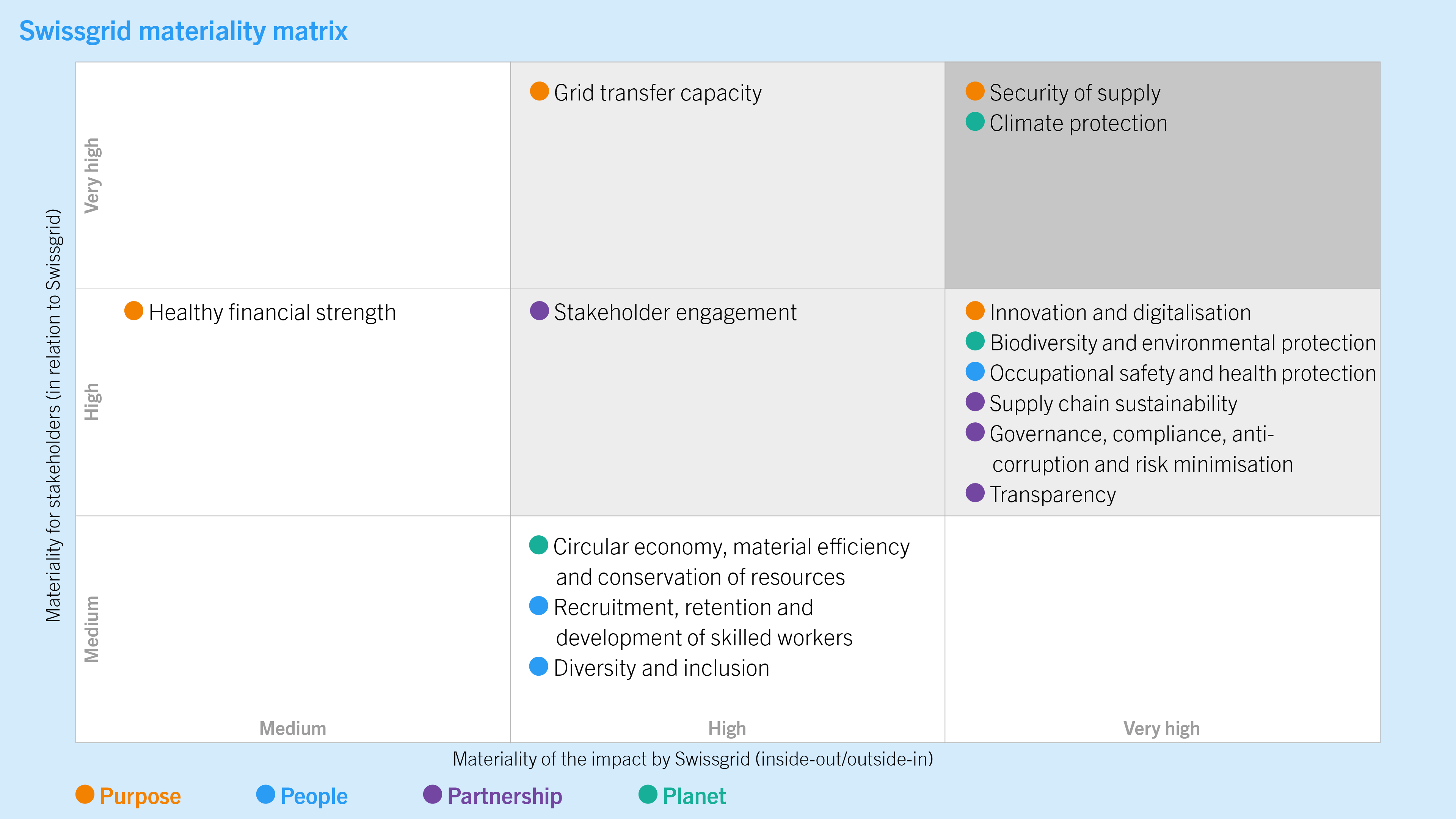Swissgrid materiality matrix
Swissgrid’s comprehensive analysis revealed 14 topics that are of particular relevance to the company. These are shown in the form of a materiality matrix – with topics allocated to the four fields of action Purpose, Planet, People and Partnership.Topics classified as immaterial are not listed.

In the matrix, the vertical axis represents the topics that are important for the company in the opinion of Swissgrid’s stakeholders. The horizontal axis illustrates on the one hand how the company is affected by certain issues (outside-in) and, on the other hand, the potential impact of the company’s business activities on society, the environment and the economy (inside-out).
The 2023 Annual Report presents the most important material topics and the associated objectives, the positive and negative effects and risks, as well as the measures taken and their effectiveness. The topics are unchanged from the previous year, but are now part of Swissgrid’s integrated Annual Report.
| Material topics | | Summary of materiality and potential impacts1 |
| Purpose | Security of supply | | Swissgrid guarantees grid-related security of supply and therefore makes a significant contribution to Switzerland’s economic and social development. By providing a needs-based grid infrastructure, Swissgrid is also laying the foundations for the integration of renewable energies and a sustainable energy future. Innovative, digital modernisation of the grid and a healthy financial strength to enable necessary investments also play a crucial role. |
| Grid transfer capacity | |
| Innovation and digitalisation | |
| Healthy financial strength | |
| Planet | Climate protection | | Swissgrid is making a significant contribution to the energy transition and is helping to decarbonise the Swiss economy. At the same time, Swissgrid generates greenhouse gas emissions along its value chain in the fulfilment of its legal mandate, which must be reduced under its climate policy and social obligations. |
| Biodiversity and environmental protection | | The expansion of the nationwide grid infrastructure can have a negative impact on biodiversity and the environment. In line with its environmental mission statement, Swissgrid is striving to avoid or minimise these impacts and to optimise the use of materials. |
| Circular economy, material efficiency and resource conservation | | |
| People | Occupational health and safety | | Safety is a top priority for Swissgrid. Occupational safety and health protection are essential for Swissgrid in order to avoid negative effects on the well-being of internal and external employees. In addition, the company is reliant on highly qualified, diverse and motivated employees in order to develop into an innovative, highly digitalised and sustainable company. The shortage of skilled labour poses new challenges for the company in the medium and long term. |
| Attracting, retaining and developing skilled workers | |
|
| Diversity and inclusion | |
| Partnership | Governance | | Responsible corporate governance and constructive partnerships are essential for Swissgrid as the operator of a critical infrastructure. Compliance with regulatory requirements, the appropriate handling of risks, integrity and transparency in business activities and good governance structures are important basic principles for the company. It is also crucial for Swissgrid to ensure that it has a sustainable supply chain in order to guarantee the economically, ecologically and socially sustainable use of resources and to recognise potential negative effects along the value chain, for example on human rights, at an early stage. |
| Compliance | |
| Anti-corruption | |
| Risk minimisation | |
| Supply chain sustainability | |
| Stakeholder engagement | |
| Transparency | |
1The potential and actual impacts described in this table and in the corresponding thematic sections of the report mainly relate to the impacts of Swissgrid’s business activities on society, the environment and the economy and/or the impacts of external factors on Swissgrid’s business activities.






